Bitcoin is the new hotness. It’s also the old hotness. Basically, it’s the hotness, and if you’re not already riding the cryptocurrency wave, there’s never been a better time to hop on. While the cryptocurrency goes up and down in value over the short term, its long-term value has only increased exponentially. Some folks see this growth as a bubble, but not like the dotcom bubble in the 90s or subprime mortgages. Basically, it’ll get more regulated. Maybe.
Regardless of all that, if you’re selling anything on your website, there’s really no reason not to take Bitcoin. I mean, in theory, if you sell something for $20, that revenue could end up being worth $30 tomorrow and $300 in a few weeks. (Or it could go the other way around and be worth $15 in a few hours–hence the bubble I mentioned earlier.)
With that in mind, if you want to really dig in and accept Bitcoin payments on your WordPress site–or just want to know more about cryptocurrency in general–keep reading.
Bitcoin, Cryptocurrency, and Blockchain
Bitcoin is a cryptocurrency based on blockchain technology. I know that’s a lot of buzzwords that seem pretty cryptic (cryptic…get it?), but it really isn’t. Or it doesn’t have to be.
First of all, what’s a cryptocurrency? Technically, it’s money that has no backing in the real world. It’s all data. Scary as that sounds, it’s not. We deal with this kinds of economics every day:
If you take away all the noise around cryptocurrencies and reduce it to a simple definition, you find it to be just limited entries in a database no one can change without fulfilling specific conditions. This may seem ordinary, but, believe it or not: this is exactly how you can define a currency.
Take the money on your bank account: What is it more than entries in a database that can only be changed under specific conditions? You can even take physical coins and notes: What are they else than limited entries in a public physical database that can only be changed if you match the condition than you physically own the coins and notes? Money is all about a verified entry in some kind of database of accounts, balances, and transactions.
Which is where blockchain comes in. It’s a better way of keeping up with those accounts, balances, and transactions than the current DB structure that’s used by pretty much everyone.
So…What Exactly is Blockchain?
A while back, Nathan and I were doing a This Week in WordPress stream (Fridays at 3pm Eastern on our Facebook and YouTube channels!), and one of the articles we discussed was about how important blockchain will be moving forward.
The problem was that neither of us could explain blockchain. We both have a fundamental grasp on it, but expressing anything beyond that was, well, beyond us. Luckily, other people don’t have that problem. So watch this video, and you’ll be fine.
Bitcoin, being a part of blockchain, is a pseudo-anonymous currency. You only have to give your identifying information when trying to cash out. If you’re only going to be trading Bitcoin for Bitcoin, you can be as shadowy and mysterious as you want. The information is stored digitally within wallets that are encrypted and–because of blockchain’s organization and ledger-keeping–incredibly secure against fraud and chargebacks.
Clear as mud? Awesome. Let’s get to taking Bitcoin payments with WordPress!
Bitcoin Payments and You
There are two kinds of WordPress ecommerce people: those who use WooCommerce and those who don’t. I don’t say that in a mean way, but Woo is pretty much the 800-lb gorilla of the WP sales space. So when you think about taking payments for one reason or another on your site, you gotta have something that either integrates with WooCommerce or at least lets you put the separate payment option near it.
That’s why I think that the GoURL Bitcoin Payment plugin is the best way to go if you’re going to start taking cryptocurrency on your site.
For starters, it’s free. We love free, right? Well, GoURL takes 1.5% out of most currencies other than Speedcoin, but that’s still cheaper than other processors.
It’s all open-source. As WP folks, that should be music to your ears. And most importantly, there are 11 add-on plugins you can get for it that integrate into all sorts of payment gateways and ecommerce solutions.
WooCommerce? Check. Easy Digital Downloads? Check. Paid Memberships Pro, Paypal Donations, and BBPress? Yeppers. They even give you the PHP so you can put the option at any checkout or in any plugin you want.
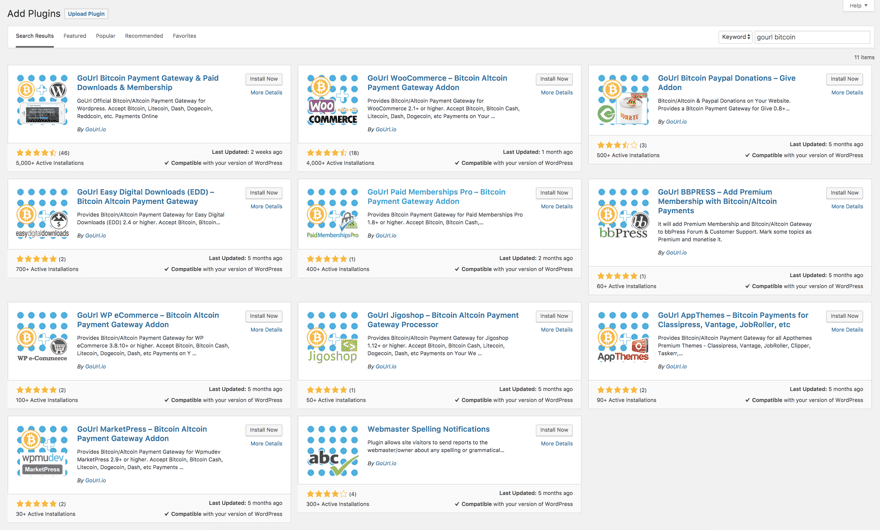
Best of All…It’s Easy!
Like everything else in the world, you gotta set up an account. It’s really easy to do, and there are links all over the GoURL backend directing you there. In fact, you have to do it before you can even access the settings pages.
Once that’s handled, you will get to a pretty standard dashboard.
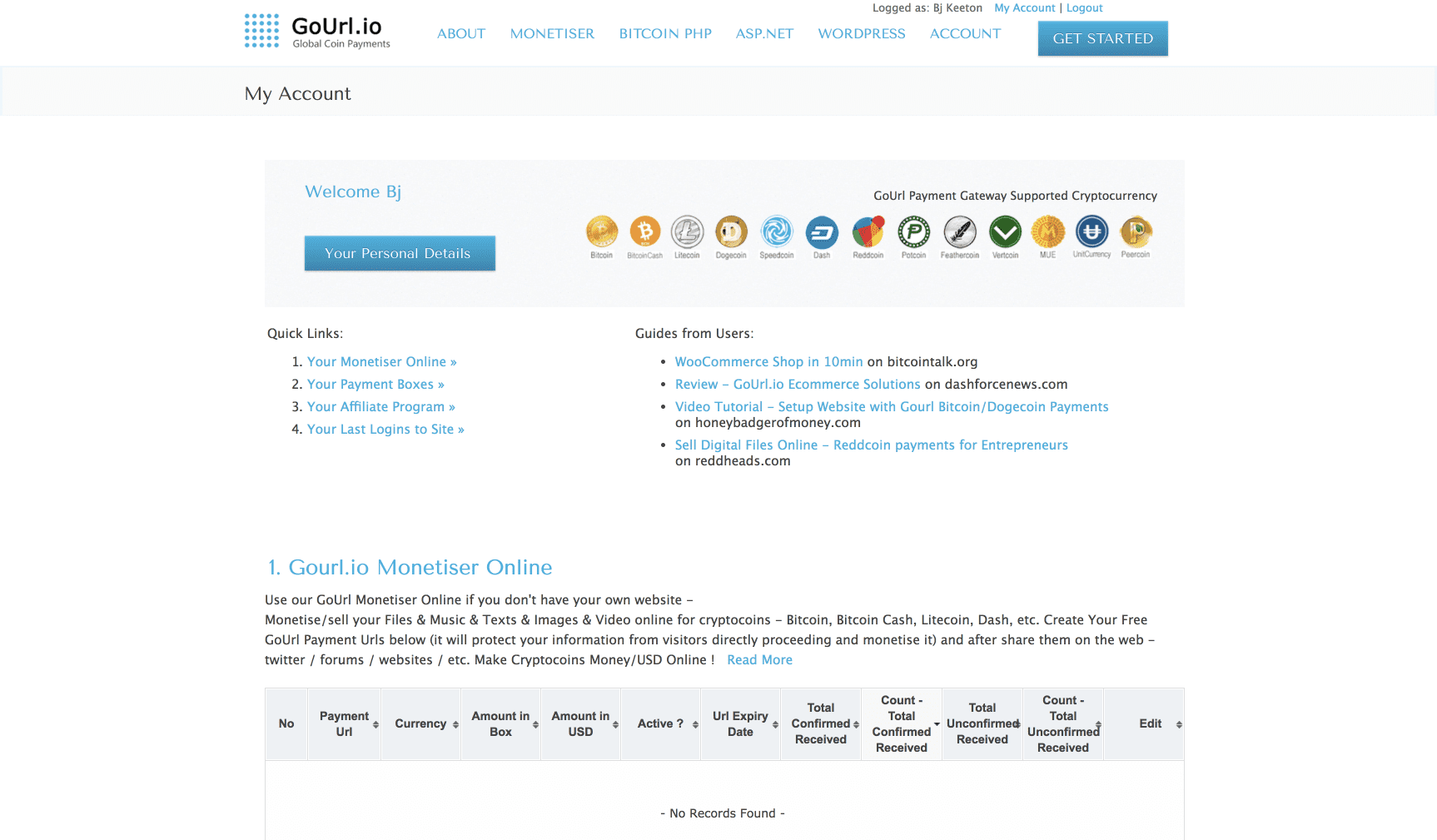
The real fun begins as you scroll down the page and see that you can set up different payment boxes. This is why you need the GoURL account. Basically, you’re using GoURL as an intermediary. They store your wallet information in a secure payment box, process the transactions, and then send your Bitcoins to you within half an hour. Good stuff.
Setting up a secure payment box is easy, and they walk you through every step of the process. If you have no idea what an external digital wallet or private key is, that’s okay. Not only will you know after this, but you will also have at least one of your own!
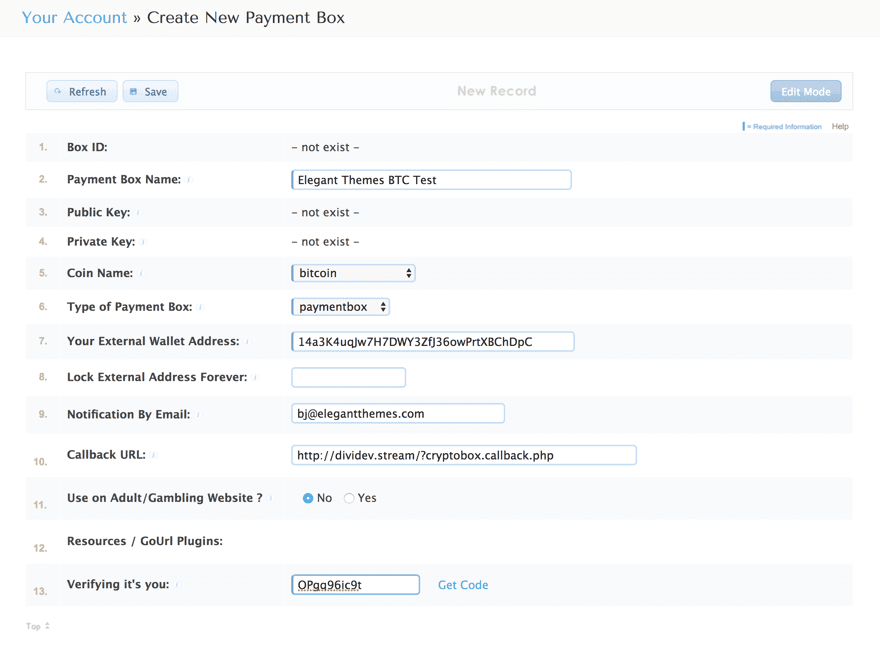
When that’s saved, you will get your public and private keys for your GoURL payment box (basically, the secure ID numbers for their software). If you have ever used an API key, you use these the same way.

Now you can head back into your GoURL Bitcoin -> Settings menu option and copy/paste the keys for the payment box you just set up.

That’s it!
You’re Ready to Rock!
You are ready to start taking payments. Because of how the service is set up, you have one of two options to actually take Bitcoin (or other cryptocurrency payments).
- Use the add-on for your ecommerce solution (WooCommerce, Give, etc.)
- Install the PHP manually into whatever checkout method you use (see here for instructions)
Both of which work pretty much the same way: they add a new payment option at checkout. This image is from the WooCommerce add-on, and it took no additional setup outside of activating the plugin.
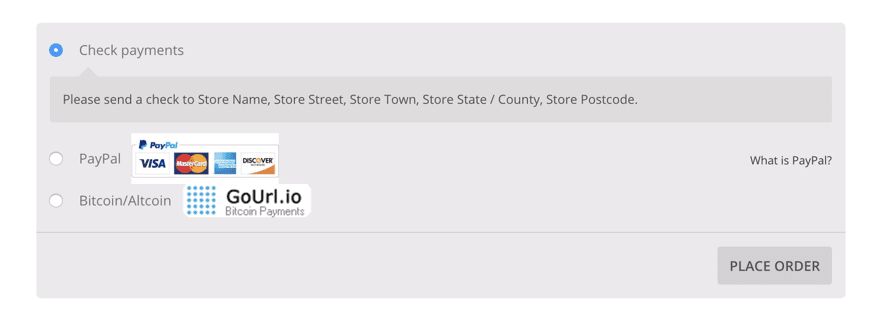
Once that’s done, it’s just business as normal.
Money of the Future?
Regardless of where you fall on the cryptocurrency and Bitcoin spectrum, I think it’s pretty safe to say that the more options you have for people to give you money, the better. And when that money has the potential to exponentially grow in value, you might as well grab yourself a couple of plugins and let people hand you digital riches.
Do you accept Bitcoin or other cryptocurrencies on your site? Why or why not, and how do you do it? Let us know and learn from each other!
Article featured image by PeterSnow / shutterstock.com






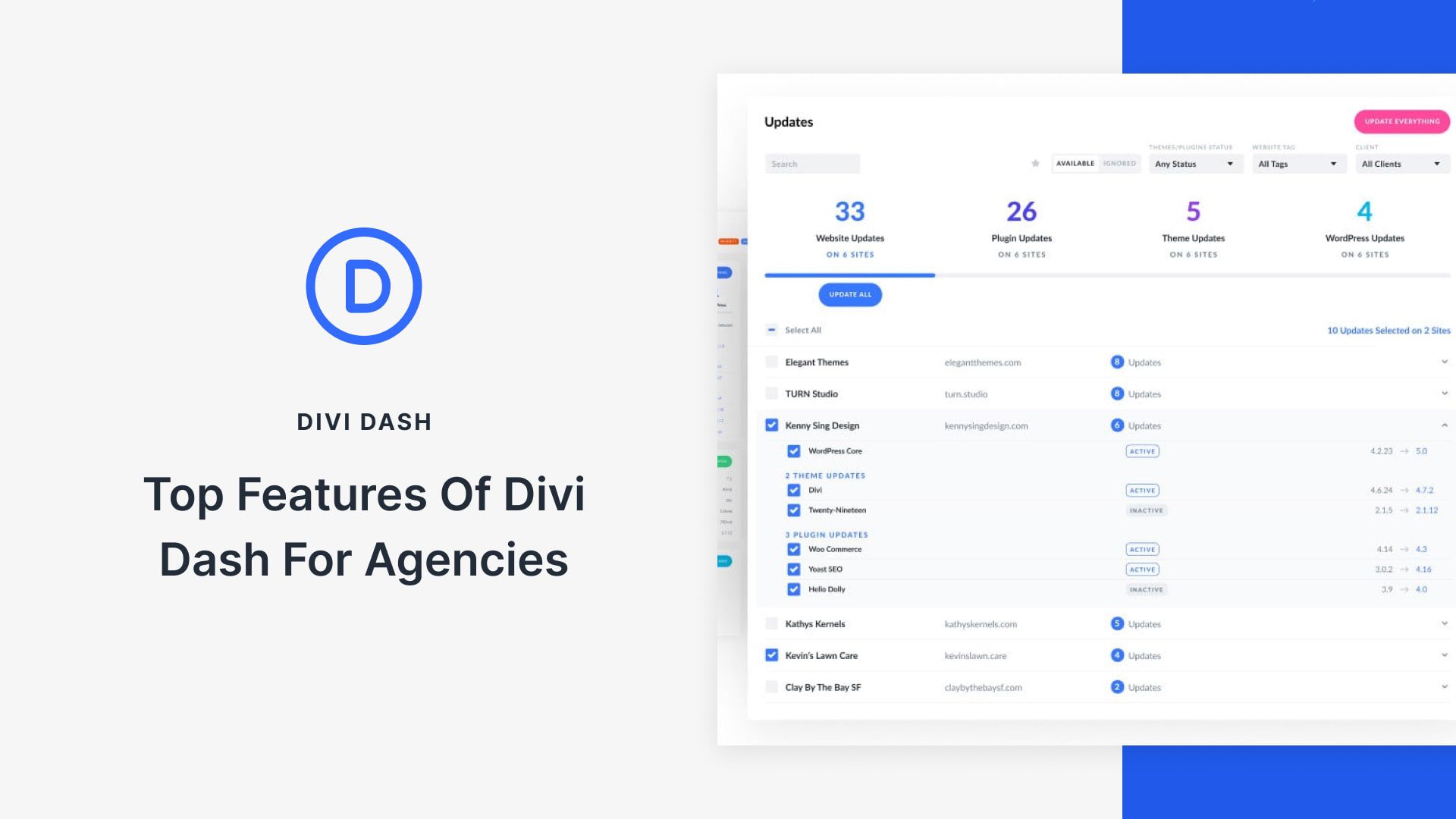
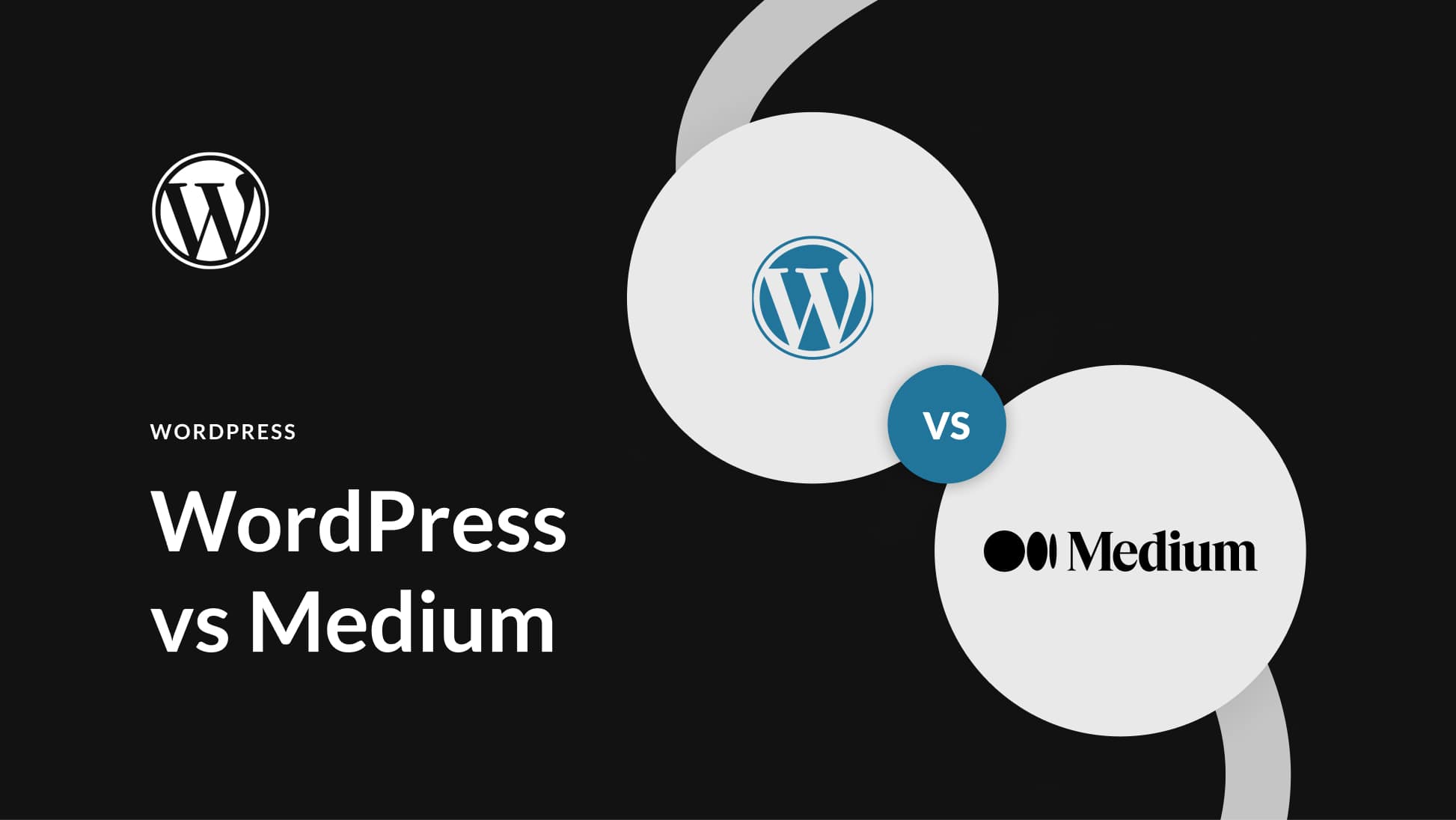

Hmmmm, it would be interesting to see Bitcoin or some other crypto currency overtake Paypal as the primary online source of taking payments. Do you see this as the future?
anyone have any examples of Divi sites set up to take crypto to share?
Imagine you landed a $15K project yesterday, your client paid you 1 bitcoin, and today it’s worth $11K. This is a double edge sword.
Always so easy with elegant theme… Thanks alot mate.
I am still waiting for a Bitcoin Plugin Who work with INR (Indian Currency) Transaction
I just set mine up thanks to this tutorial – thank you so much!
There is a deeper discussion needed here with blockchain technology and how elegant themes and wordpress can use this new technology to allow designers and developers to finally create content which can be authenticated, non plagiarised and is hack proof without third party verification. The hype around Kodak coin is an example of how for many years photographers have had no way of truly protecting their images online and I’m excited there is hope for internet protection of images via blockchain technology. Let’s hope that other applications arise where content and design can be protected too.
I dont think bitcoin will be a practical currency in the future, it will be a ripple or something else which has a comparison to fiat decimal. Paying 0.0005 btc for something is insensible when everybody is used to using dollars and bitcoin mining fees, slowness, volatility make it impractical at the moment.
I look forward to what Blockchain can do for security, too. While I am not huge on DRM and restriction personally (like, my books are all being pirated and I am like…meh), but the hack proof verification for major businesses and firms will be a huge help. Once we’re able to do what you mention with Kodak on a larger scale, it’s gonna change everything.
FWIW, I believe Stripe accepts Bitcoin as well and may be more of a “household name” than GoURL.
I love bitcoin and other cryptocurrencies, however, I feel it fluctuates too much to be used as a payment method. Lately has been really bad, just today it has fluctuated over $1,000 up and down. This could be a win for you if someone makes a purchase for an item with $10 in bitcoin and tomorrow that $10 is now $12, but, it can work the opposite way.
For me, bitcoin has become more of an investment and not an everyday currency. Obviously, this is just my opinion, but, I feel until it stabilizes out, its rough to take payments for products where you may have a set margin.
I treat it the same way. I just took a little cash out of a different account and tossed it at ETH because of its spike lately (it dropped a bit, so I figured it was a fluke). I totally use it as investment, too. I mean, I gotta pay for that runDisney half-marathon somehow, right? 😉
Surely those who are business bitcoin happy with this feature.
Excellent article, BJ, and one that anyone involved in ecommerce should be following closely. There is no question cryptocurrencies – bitcoin in particular – are looming. They will be the prefered method of payment, probably sooner than most of us realize. (Did you know bitcoin is already an officially accepted currency in Japan?)
However, due to the volatility in cryptocurrency valuations, especially over the last couple of months, this plugin’s solution is useless unless it also incorporates a dynamic crypto price converter, linked to one of the major exchanges, such that it updates the crypto price of the item being sold based on the current rates/prices.
As you mentioned in the second paragraph of this article, if you take a fixed cryptocurrency price for a $30 item, it could be worth $300 tomorrow, or $3.
The only way around this, that I can see, is to link the plugin to one of the major exchanges, such as Kraken or Coinbase, then when the customer goes to check out, they can see the dollar price of the item, and if they want to pay in a cryptocurrency, they should select which one they want to use, from a list the vendor has limited to those currencies they will accept (probably at least bitcoin, Etherium, and Litecoin), and as soon as the customer picks a currency, the plugin will AJAX-update the price for the item being purchased in that currency.
Does anyone see a better way around currency volatility?
When configuring the plugin, only the product value of $$ is placed, the plugin will calculate the amount of BTC or Satoshi automatically every 30 minutes.
“Please specify price in USD or in Cryptocoins. You cannot place prices in two boxes together. If you want to accept multiple coins – please use price in USD, payment box will automatically convert that USD amount to cryptocoin amount using today live cryptocurrency exchange rates (updated every 30min). Using that functionality (price in USD), you don’t need to worry if cryptocurrency prices go down or go up. Visitors will pay you all times the actual price which is linked on daily exchange price in USD on the time of purchase. Also you can use Poloniex ‘autosell’ feature (auto trade your cryptocoins to USD).”
An interesting Plugin to develop would be: A plugin where the buyer makes his payment and the payment goes directly to the seller’s wallet without going through intermediaries, GoUrl has intermediaries. A real example, Prestashop has payment modules in bitcoin, ethereum, bitcoincash etc. without intermediaries.
anyway … I installed gourl, I’ll see how it works.
That’s an excellent point, David. an AJAX call to, say, Coinbase, would be awesome. I know there are browser extensions like MetaMask that do this sort of thing, too.
I bet there’s some money in there if you wanted to throw together a plugin 😉
the base prices are all in fiat and the crypto price isnt even shown until the checkout process if they decide to go that route, right? but with fees so high for bitcoin translations i doubt many would be using BTC to buy things with right now… maby the lightning network will help with this but that’s still to be seen.
Thank you for this tutorial. Now that cryptocurrencies are becoming more and more popular, if I had an online store, I would definitely consider accepting Bitcoin payments.